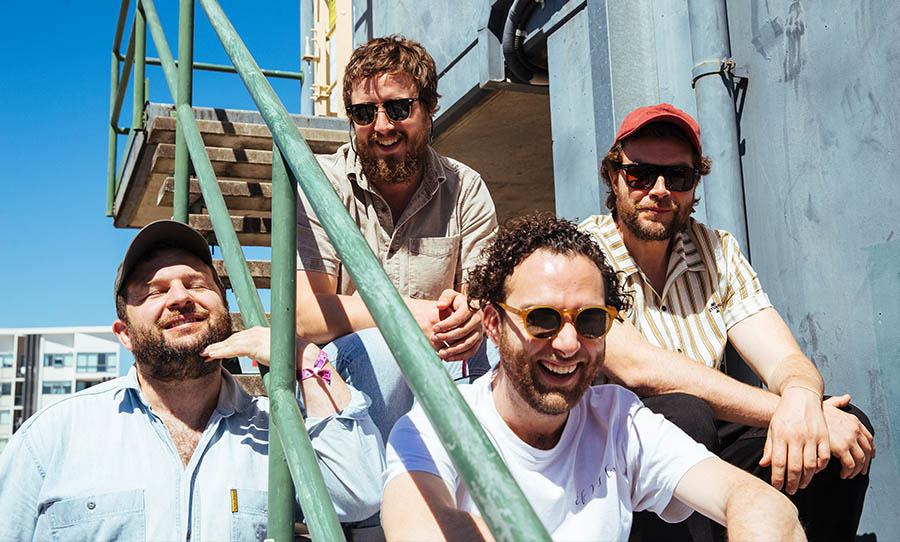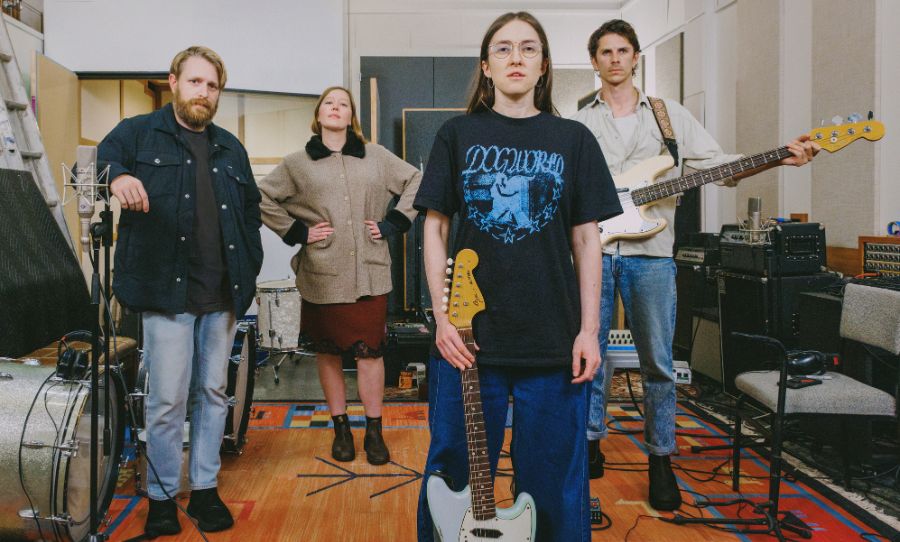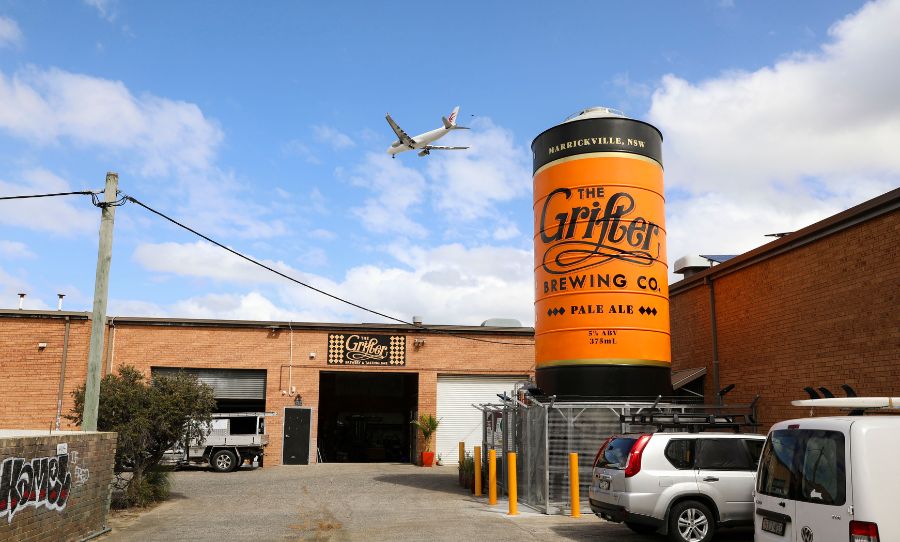The world, it seems, is ending. The climate crisis has hit our planet like a semi-trailer, and humanity are doing little to address this problem, hence our final days are likely upon us. Nevertheless, we all continue working towards some vague future—a future that presumably doesn’t exist. The impending armaggedon has reduced our lives to some kind of absurd dance, and on their third studio album Doomsday Ballet, Bad//Dreems have captured the wild confusion of this bizarre situation.
On their previous two albums—Dogs At Bay (2015) and Gutful (2017)—the Adelaide outfit leaned more heavily into a more straight-forward, nostalgic kind of Aussie pub-rock. But now, on what the band have described as their “first studio album,” they’ve expanded both their technical abilities and conceptual scope. The result is a collection of tracks that play out like an absurd stream of consciousness. It’s undeniably the group’s most ambitious release to date, so shortly before they released it we caught up to chat all about it.
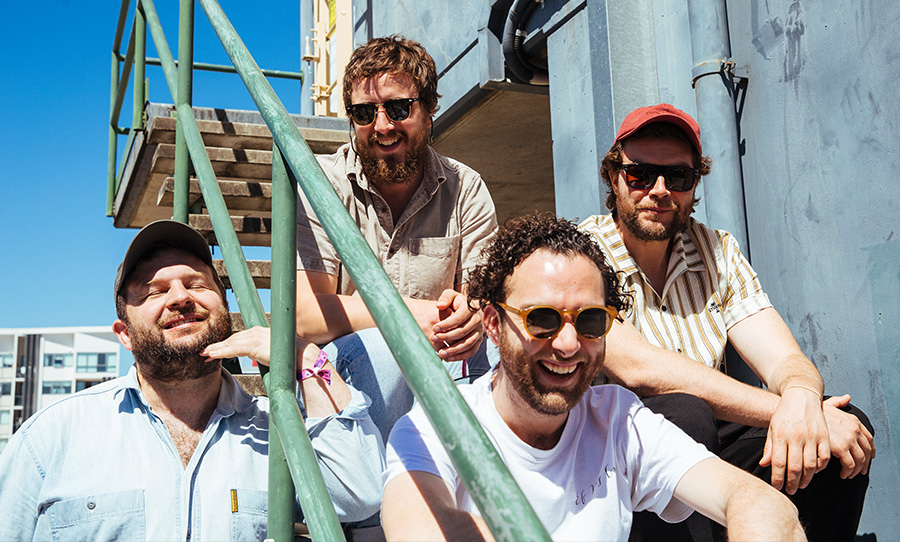
“All these structures that have been in place for hundreds of years are being broken down. The only way I can think of coming to terms with that is through absurdist terms.”
HAPPY: I was listening to Gutful the other morning before I flew up here. I’ve got one of the records where they fucked up the album cover…
ALEX: Oh yeah, that’s the collector’s edition. That was one of a number of obstacles we had to overcome with that release. We got the records back, and the label said “um, the vinyl’s arrived a bit late… and well, we’ll just let you look at it…”
MILES: We thought they sent the first through as a joke, then we realised they were all like that.
HAPPY: Well now the next record’s done, Doomsday Ballet. I’m keen to talk about what’s gone down in the period between these two albums. You’ve said this new record is your first ‘studio album’… was there a specific point in time where you decided you wanted to go a slightly new direction?
ALEX: Yeah, I think so. After the first album, we just kind of kept rolling into the next one. We didn’t really try to change too much up. But with this one, there were a combination of factors—a few industry things that took a bit of time, we had band members living in different cities… so we were doing a lot more demos and over-dubs, rather than just recording in a room like we had done before. We’d record in a room a little bit, then James and Miles would go back to Melbourne, and Ali, who owns a studio, would work with me and Ben. That’s the practical side of things, but aside from all that, we’d always wanted to start expanding our pallettes. We had many different types of songs that we’d written, and we wanted to bring them out.
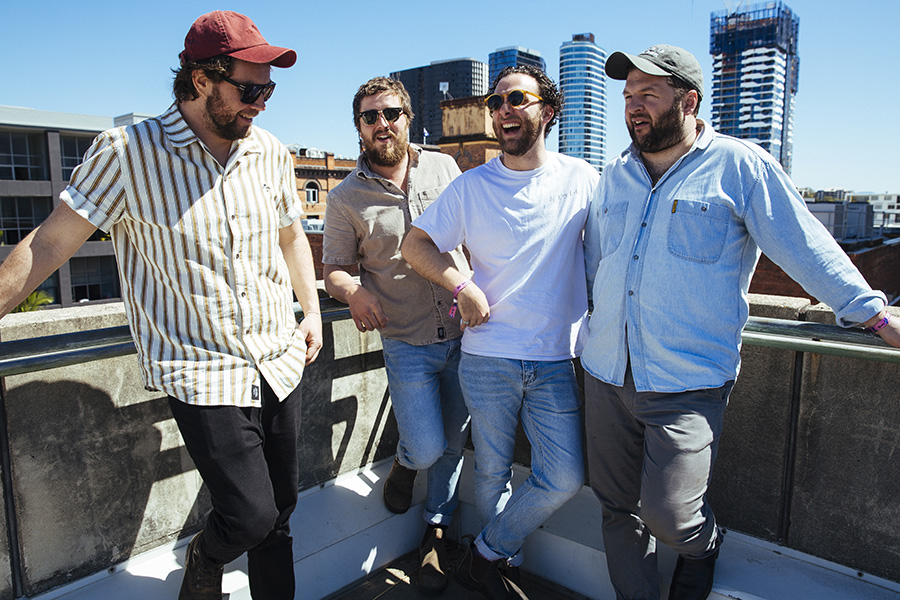
BEN: I think the more melodic stuff we’d never really had time to explore before. You can only really do that if you spend time working on tones and lyrics, workshopping everything.
ALEX: With the live band, which is how we started out, you fall into a particular way of playing. For us that what very loud and energetic and fast. The also, we write lots of other types of songs – songs that take more subtlety and musicianship. We’ve worked on that a lot. It’s really hard to play a ballad, I think. For us at least.
BEN: What also helped is that Ali was part of the writing on guitar. He’s an infinitely better guitarist than I am. So the parts were actually played properly.
ALEX: It’s the first album where we’ve got two guitarists, so I think that added to the scope of what we could do.
ALI: That process continued into the studio as well, with Jack Ladder hopping on board and Burke Reid. I noticed a lot of times sitting down with the guitar, on Double Dreaming for example, we were doing things that didn’t necessarily come easily to the musicians, but in hindsight they brought a real element of uniqueness to the songs. It brought a really different sound to the guitars, and the same goes for the drums. There are a lot of weird drum beats on it. There was a lot of stuff on there with real perspicacity.
BEN: Woah!
ALI: I just wanted to say that word.
HAPPY: You’ve done a few live shows recently… you had the Double Dreaming shows and now BIGSOUND. After working on music in this more studio-orientated way, what has been like taking that back to the live setting?
BEN: It’s easy to do the ones that are reminiscent of the previous rock, fast, up-tempo tracks. But we’ve really got to set aside some studio time where we refine the new types of songs that will be on the album.
MILES: There are some big atmospheric tracks.
BEN: And some slower ones that we’ve always kept a distance from live, because they’re tough to do. We’re definitely going to explore that. We’re definitely going to make sure the live set has that element going forward.
ALI: There’s keys and synths on almost every song now. That was Jack Ladder.
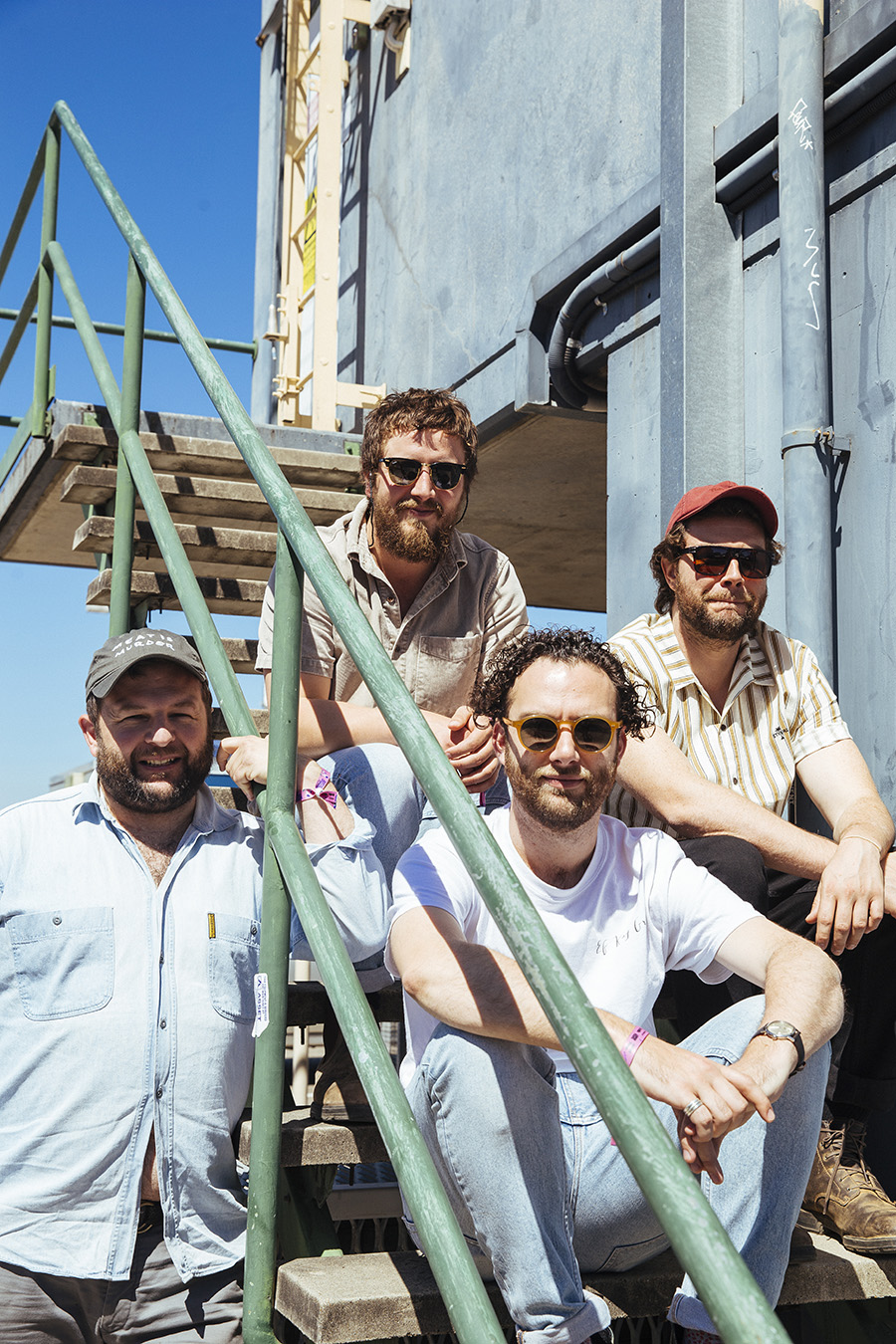
HAPPY: I didn’t realise Jack Ladder was involved with the record… how did that come about?
ALEX: There’s a photographer we’ve always worked with, who’s taken every photo for our album covers. That’s Mclean Stephenson, you’ve probably heard of him. We’re pretty good friends with him, so we sent him a couple of demos to start thinking about the artwork… then, unknown to me and without permission, he forwarded them onto his friend Jack Ladder. We’d never met him before, but we’re obviously big fans of his music, and he really liked the demos. Then the first proposition was that him and Mclean produce the album, but considering that Mclean had never produced an album before, we didn’t think that was the best idea. Even if he seemed to think he’d be able to do it. Then we sent the stuff out to other producers, and one of them was Burke Reid. He’d worked with Jack Ladder a lot before… I think he’s done two of Jack’s albums. So they’re good friends and good working partners. Then we proposed they work on it together. I suppose Burke was the engineer, while Jack provided a lot of creative oversight. He played instruments on a lot of the albums—probably half of the tracks. It was an awesome team. I think it was our best experience in the studio.
HAPPY: What studio was it at?
BEN: Twin Earth in Adelaide. It’s cheap and awesome.
ALI: It’s this guy who’s been collecting gear for about 25 years. It’s all just thrown together, and it’s a bit of a weird vibe – it’s just at his house.
ALEX: But we could record there 24 hours a day at a cheap price. And the guy there looked exactly like Louis C.K… which was a bit weird.
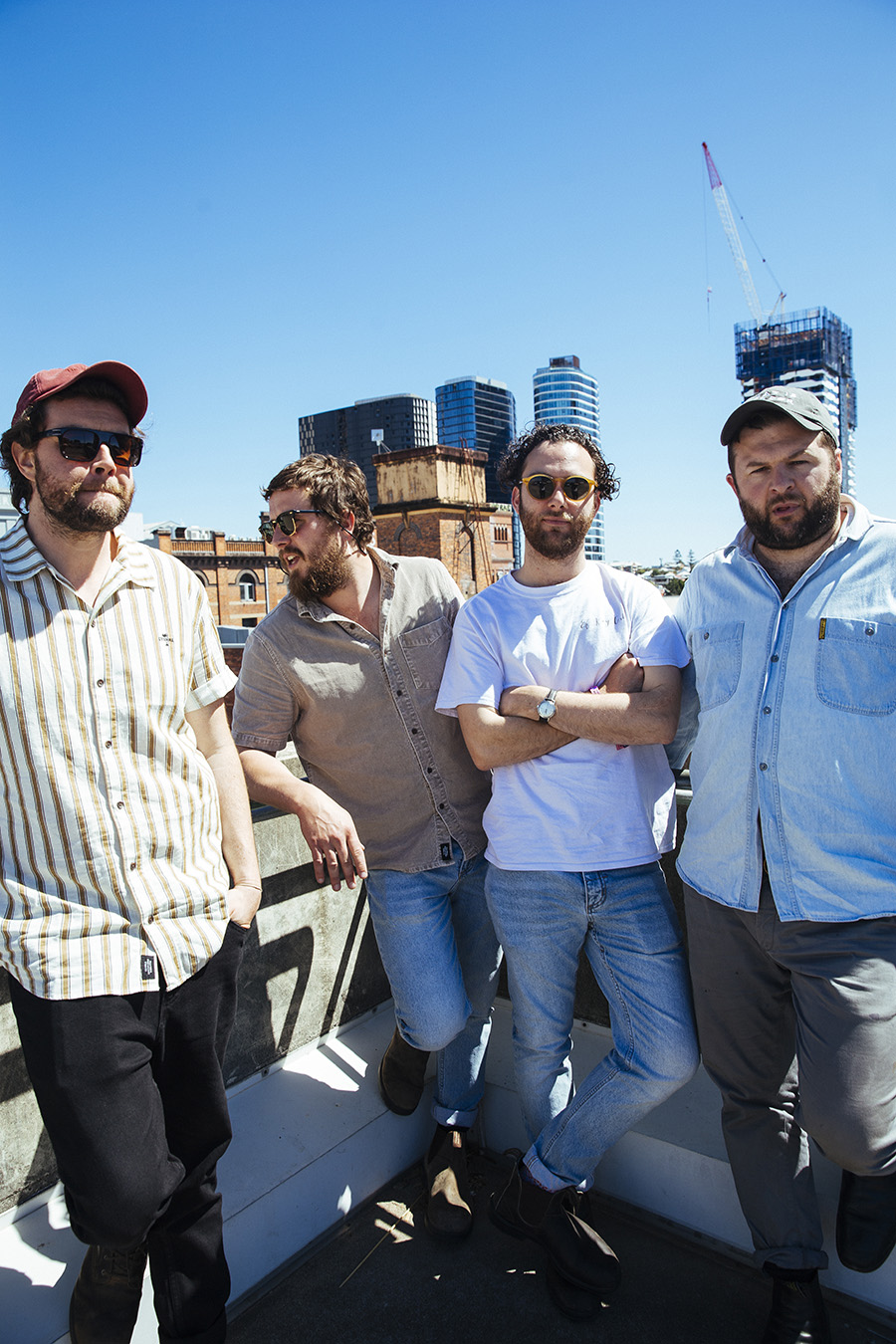
HAPPY: Where’s your studio Ali?
ALI: That’s in Grange, which is the same side of the city… but that’s also my house. It’s just the front area of my house.
HAPPY: I’d like to talk more about the conceptual side of the record. From what we’ve heard of the record so far, it all seems quite conceptually driven. With the title Doomsday Ballet, and a lot of the lyrics focusing on some sort of cultural apocalypse.
ALEX: Yeah, the title came last. Like all the albums, the prevailing theme becomes clear as the songs come together. Our lyrics have gone from the more literal, like in the first two albums, to something that’s a bit more stream-of-conscious or absurdist, which I think is a bit more in-keeping with what’s going on in the world at the moment. Everything’s very crazy and confused… almost psychedelic. Everything feels like the end of days, with Trump and everything. All these structures that have been in place for hundreds of years are being broken down. The only way I can think of coming to terms with that is through absurdist terms. The lyrics are no real search for meaning, but rather an expression of that confusion. However, on the flip side, there are a lot of songs… well, a lot of people always say that our songs are nostalgic. So yeah, there are a few of those songs as well. They counterbalance the apocalyptic feel of the album.
HAPPY: Well yeah, I was about to say that there are these real moments of serenity within the absurdism.
ALEX: Yeah, when we were piecing it all together, the image we had in mind was dancing at the end of days, while there are these memories of simpler times. That’s how we’ve come to understand the nature of the album. There are songs that are chaotic and disturbing with non-linear imagery, then that’s counterbalanced by songs that are nostalgic or yearning for a simpler time.
BEN: Yeah, what he said.
Doomsday Ballet is out now. Listen above.
